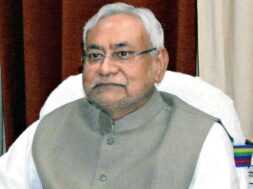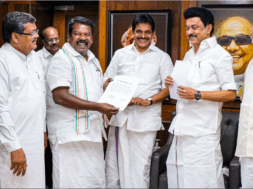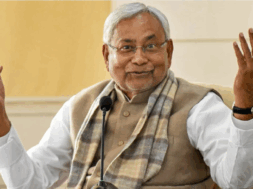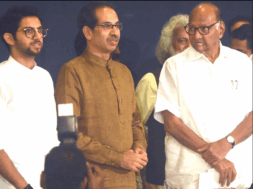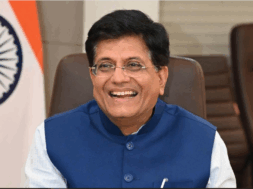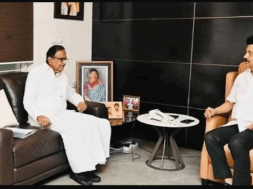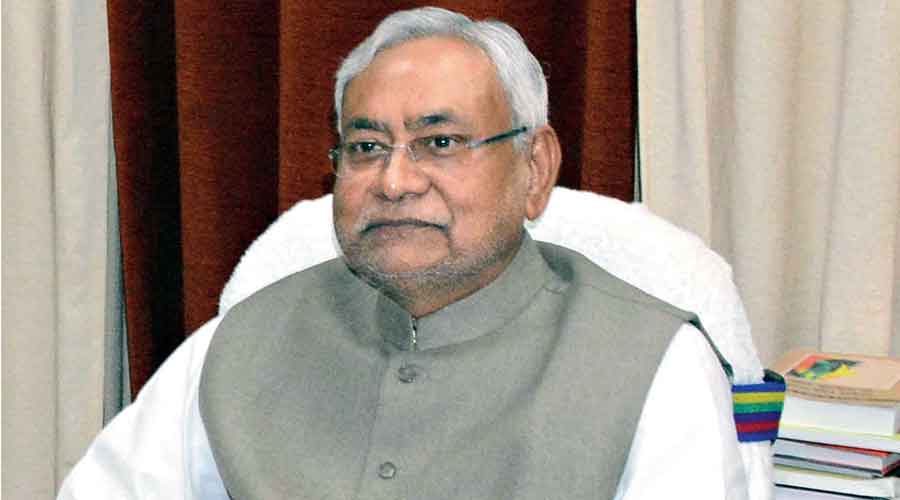
Manas Dasgupta
NEW DELHI, Aug 8: Worried over the fate of the former Maharashtra chief minister Uddhav Thackeray, whom the BJP managed to upstage by instigating a rebellion within the ruling party, the Bihar chief minister Nitish Kumar is learnt to be rethinking about his Janata Dal (United)’s continued alliance with the BJP in Bihar.
Kumar had been drifting away from the BJP for some time and he made it clear by abstaining from four meetings convened by the prime minister Narendra Modi topping with boycotting the Niti Aayog meeting on Sunday chaired by Modi. Kumar has summoned all JD(U) MLAs in Patna on Tuesday where he is believed to be taking a decision on continuing the party’s alliance with the BJP. An early decision could be expected as Kumar would be reluctant to give the BJP a long rope to fuel a Shiv Sena-type rebellion within the JD(U) to remove him from the chief ministership and grab the chair for the party.
The party sources said the former union minister RCP Singh, who resigned from the JD(U) on Sunday hurling tonnes of abuses on Kumar, may be used by the BJP as Eknath Shinde of Maharashtra to split the ruling party and remove the chief minister. Singh is known to be very close to the union home minister Amit Shah and enjoyed the BJP’s full backing in any misadventure he might take in Bihar.
The immediate instigation for the JD(U)’s rethinking over its alliance with the BJP was learnt to be the BJP national president JP Nadda’s recent assertions that all regional parties in the country would be slowly eliminated and replaced by the BJP. The remarks followed by the BJP’s announcement that it had decided to organise “yatras” in 200 state Assembly constituencies in Bihar preparing for the next elections which indicated that the party planned to contest all the 243 seats in Bihar terminating its electoral understanding with the JD(U).
What has really caused concern to Kumar is the way Thackeray was treated by the BJP in Maharashtra. In Bihar too the BJP is a larger party like it is in Maharashtra and yet the chief minister’s chair remained with the smaller party.
Like the Shiv Sena – BJP alliance in Maharashtra, the BJP and Nitish Kumar held a decades-long alliance till 2013 when the latter opted to team with the Congress and the RJD (led then by Lalu Yadav and now by Lalu’s son, Tejashwi). However, a huge disconnect between Lalu’s sons, who were ministers, and Nitish Kumar led to him ending the alliance after the young leaders were accused of corruption. Nitish Kumar then rebraided his party with the BJP.
“We will take a decision tomorrow after all our leaders review the situation,” said one of Bihar’s most senior ministers, Vijay Choudhary, who is also known for being a close confidante of Nitish Kumar. Leaders from the JD(U) have accused the BJP of trying to split the party by operating against him. At a meeting today with Tarkishore Prasad, who is the Deputy Chief Minister and from the BJP, Nitish Kumar reportedly said “There’s nothing serious” in the context of the headline-generating conflict. The BJP has asked its leaders not to comment on the controversy and to wait for Nitish Kumar’s decision on Tuesday.
Despite Nitish Kumar’s meeting with the Deputy Chief Minister, his party is going hard at the BJP, accusing it of working against Nitish Kumar in the general election last year, and of disrespecting allies. Nitish Kumar’s aides are citing, as proof, the recent comment by BJP boss JP Nadda, who said “Only the BJP will remain, other parties will disappear.”
Sources close to the Chief Minister say he’s not in any mood to be placated; tomorrow, he will meet with all his MLAs or legislators to decide on what happens next. An early reading has reportedly convinced him that MLAs are not willing to face mid-term elections and would prefer a new alliance over that prospect.
Tejashwi Yadav, the leader of the Rashtriya Janata Dal (RJD) will offer support to Nitish Kumar should he dump the BJP, the Opposition party said on Monday. The RJD has recently become the single-largest party in Bihar. The combined strength of the RJD, the Chief Minister’s JDU, and the Congress, is large enough to form the government.
Nitish Kumar’s anger, say sources close to him, rests mainly in what he perceives as a concerted attempt by Union Minister Amit Shah to “remote control” Bihar. To register his protest, Nitish Kumar has skipped several key meetings called by Amit Shah and Prime Minister Narendra Modi. He stayed away from the Niti Aayog meeting claiming to be unwell but was present at two government functions in Patna.
Nitish Kumar has these key demands for the BJP: more union ministries (his party had been allocated one, which was given to RCP Singh) and that elections for Bihar be held along with the next general election in 2024 (instead of a year later). In an attempt to make good, Amit Shah in a recent trip to Patna said Nitish Kumar would be the face of their alliance in the next state election; rebuffing that gesture, yesterday, Lalan Singh of the JDU said any plans for the next election remain undecided.
Nitish Kumar is reportedly convinced that Bihar will become the sequel to Maharashtra, which has just witnessed the removal of Uddhav Thackeray as the head of its government in an exercise that was meticulously planned and implemented by the BJP. Hence, a public attack by his top aide yesterday, accusing the BJP “of working to break our party.”
Like Uddhav Thackeray, Nitish Kumar is a regional leader attempting to preserve his turf and withstand the onslaught of the BJP. In Maharashtra, Uddhav Thackeray’s downfall was powered by the rebellion of a senior leader from his own party, Eknath Shinde. Working closely with the BJP, Ekanth Shinde organized a mega-revolt within the Shiv Sena, one so consequential that apart from having to quit as Chief Minister, Uddhav Thackeray is now fighting in the Supreme Court to have his portion of the party retain its tag as the real Shiv Sena.
Like Uddhav Thackeray, Nitish Kumar has a deep and historic connect with the BJP. Like Uddhav Thackeray, he mixed things up by abandoning the BJP for an alliance with Opposition parties. The difference is that Nitish Kumar ditched those parties to return to the BJP in 2017, while Uddhav Thackeray went down fighting while in partnership with the Congress and Sharad Pawar’s NCP.
But apart from that, Nitish Kumar feels the BJP playbook against allies is being hurled against him. In this, he perceives the dominant hand of Amit Shah, who, he feels, has planted, in their combined government, ministers who are especially close to him. Whether or not it is a conspiracy theory, this is why Nitish Kumar turned on RCP Singh, a senior leader within his own party. In 2021, RCP Singh was chosen by Nitish Kumar to represent the Janata Dal United in the union government. Back in Bihar, he was seen as increasingly close to Amit Shah, and, over time, as a man working within Nitish Kumar’s party to foment resentment against the Chief Minister.
Two months ago, Nitish Kumar refused to extend his term in the Rajya Sabha; this meant RCP Singh’s tenure in the Union government ended. It was followed this weekend by RCP Singh being accused by his party of vast corruption. Nitish Kumar’s top aide, Rajiv Ranjan Singh or “Lallan” Singh, reasserted today that RCP Singh was taking his cues from the BJP. “When we were asked to provide one union minister,” he said, “RCP Singh said that Amit Shah had told him that only he (RCP) was acceptable. And Nitish Kumar said, ‘If you have decided with them, then go, what do you want me to say?'”
Nitish Kumar will deliberate on whether, in the next general election, he can take on PM Modi in Bihar at a time when the PM’s approval ratings are seen as immensely high. He also wants a larger say in determining who the BJP appoints as ministers in Bihar.
